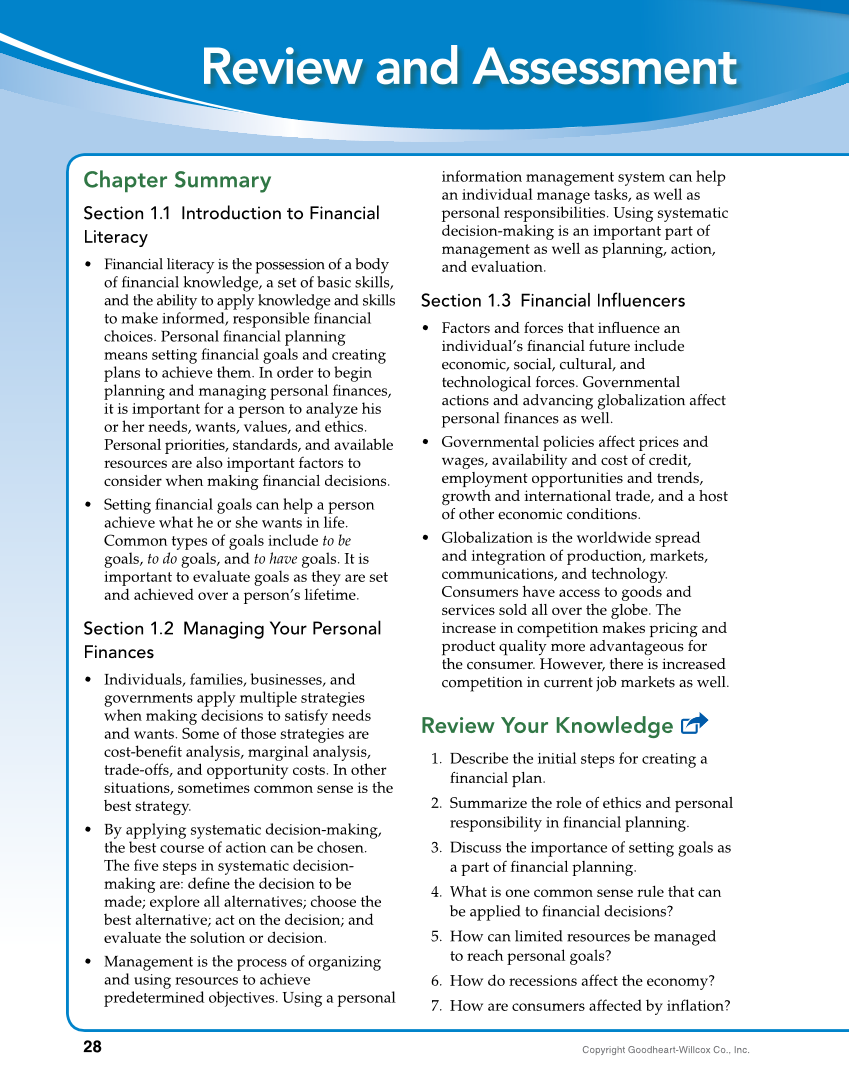Copyright Goodheart-Willcox Co., Inc. 28 Review and Assessment Chapter Summary Section 1.1 Introduction to Financial Literacy • Financial literacy is the possession of a body of financial knowledge, a set of basic skills, and the ability to apply knowledge and skills to make informed, responsible financial choices. Personal financial planning means setting financial goals and creating plans to achieve them. In order to begin planning and managing personal finances, it is important for a person to analyze his or her needs, wants, values, and ethics. Personal priorities, standards, and available resources are also important factors to consider when making financial decisions. • Setting financial goals can help a person achieve what he or she wants in life. Common types of goals include to be goals, to do goals, and to have goals. It is important to evaluate goals as they are set and achieved over a person’s lifetime. Section 1.2 Managing Your Personal Finances • Individuals, families, businesses, and governments apply multiple strategies when making decisions to satisfy needs and wants. Some of those strategies are cost-benefit analysis, marginal analysis, trade-offs, and opportunity costs. In other situations, sometimes common sense is the best strategy. • By applying systematic decision-making, the best course of action can be chosen. The five steps in systematic decision- making are: define the decision to be made explore all alternatives choose the best alternative act on the decision and evaluate the solution or decision. • Management is the process of organizing and using resources to achieve predetermined objectives. Using a personal information management system can help an individual manage tasks, as well as personal responsibilities. Using systematic decision-making is an important part of management as well as planning, action, and evaluation. Section 1.3 Financial Influencers • Factors and forces that influence an individual’s financial future include economic, social, cultural, and technological forces. Governmental actions and advancing globalization affect personal finances as well. • Governmental policies affect prices and wages, availability and cost of credit, employment opportunities and trends, growth and international trade, and a host of other economic conditions. • Globalization is the worldwide spread and integration of production, markets, communications, and technology. Consumers have access to goods and services sold all over the globe. The increase in competition makes pricing and product quality more advantageous for the consumer. However, there is increased competition in current job markets as well. Review Your Knowledge 1. Describe the initial steps for creating a financial plan. 2. Summarize the role of ethics and personal responsibility in financial planning. 3. Discuss the importance of setting goals as a part of financial planning. 4. What is one common sense rule that can be applied to financial decisions? 5. How can limited resources be managed to reach personal goals? 6. How do recessions affect the economy? 7. How are consumers affected by inflation?
